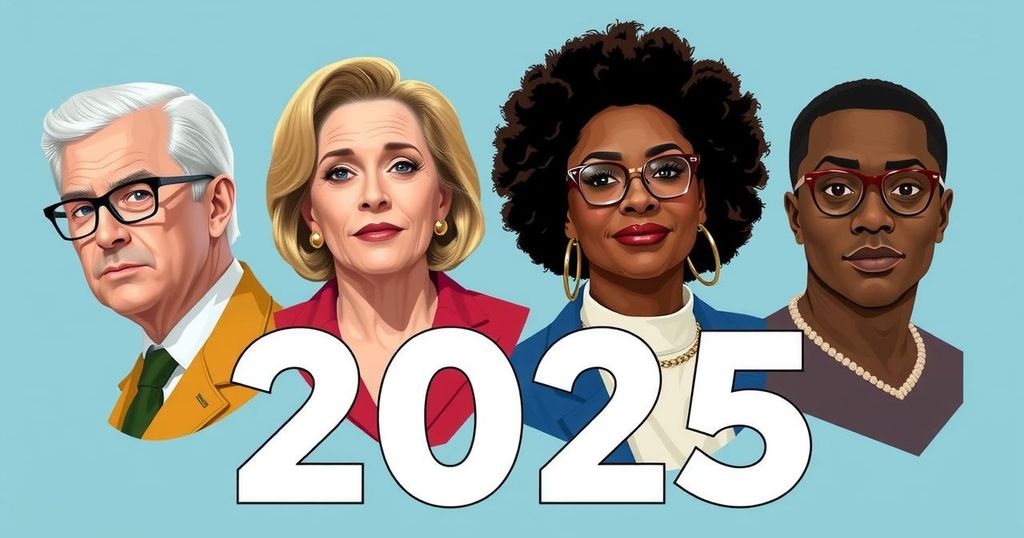In 2025, key elections will take place in Belarus, Germany, the Philippines, Canada, and Chile. These elections will address critical issues such as autocracy, economic recession, power struggles, and public sentiment, reflecting broader global themes of inflation and populism. The stakes are high, with potential ramifications for governance and international relations in each country.
As the global political landscape evolves, the year 2025 will witness several pivotal elections across different nations, despite fewer contests compared to the previous year. Key themes will dominate these elections, including inflation, the ascendance of populist movements, and the implications of geopolitical conflicts. This analysis considers five significant elections: Belarus, Germany, the Philippines, Canada, and Chile, each carrying substantial stakes for their respective futures.
In Belarus, President Alexander Lukashenko is poised to extend his long-standing rule in an election devoid of genuine opposition, scheduled for January 26, 2025. The absence of fair electoral conditions, highlighted by the repression following the post-2020 protests, intensifies the likelihood of continuing autocratic governance. Lukashenko’s victory could reinforce Belarus’s role as a strategic ally to Russia.
Germany faces an unexpected federal election on February 23, 2025, following the collapse of Chancellor Olaf Scholz’s coalition government. With pressing economic challenges, including inflation and recession, the political landscape is fraught with tension. Polls indicate heightened competition, with the conservative Christian Democratic Union likely to gain ground, potentially leading to a change in leadership.
Voters in the Philippines will have an opportunity to elect 12 senators and local officials on May 12, 2025. This midterm election is crucial for President Ferdinand Marcos Jr., as the outcome could either consolidate or challenge his power amid internal disputes, particularly regarding the Vice Presidency. A dominant Senate for Marcos could significantly impact potential impeachment proceedings against Vice President Sara Duterte.
In Canada, Prime Minister Justin Trudeau’s government may face an election prior to the scheduled date of October 20, 2025. With his coalition vulnerable and public dissatisfaction over rising inflation, Trudeau confronts a formidable challenge from opposition leader Pierre Poilievre. This election’s outcomes may redefine national policy direction, reflecting broader ideological shifts.
Finally, Chile’s presidential election, slated for November 16, 2025, may culminate in a runoff in December. Incumbent President Gabriel Boric’s inability to achieve significant reforms amid political gridlock leaves the field open for the opposition. The increasing crime rates and ongoing economic recovery are critical issues influencing voter sentiment, positioning the right-wing coalition favorably as the election approaches.
The upcoming elections in 2025 are significant for a variety of countries across the globe. Each election is shaped by unique political, economic, and social dynamics. The elections will address pressing challenges such as economic instability, governance issues, and political rivalries. As nations grapple with the ramifications of inflation and geopolitical tensions, the stakes will vary across Belarus, Germany, the Philippines, Canada, and Chile. Understanding these elections requires recognizing the contemporary context in which each nation operates and the historical legacies that shape their current political environments. Belarus’s elections highlight the struggle against autocracy, Germany’s rapid political shifts respond to economic challenges, while in the Philippines, the power dynamics between President Marcos Jr. and Vice President Duterte play a central role. In Canada, Trudeau’s coalition faces mounting pressure from a resurgent opposition, and in Chile, the future direction is pivotal as the country emerges from recent upheaval. Each election reflects broader societal trends, where populism and economic issues resonate strongly among voters, suggesting a transformative year ahead.
In summation, the elections of 2025 present critical junctures for Belarus, Germany, the Philippines, Canada, and Chile, each facing unique challenges and stakes. The ongoing struggle for democracy in Belarus under Lukashenko’s regime, Germany’s tumultuous coalition environment, the political machinations in the Philippines, the potential reshaping of Canadian identity under Trudeau or Poilievre, and Chile’s quest for stability post-constitution failures highlight the diverse political landscapes. As citizens prepare to exercise their right to vote, the outcomes will likely reverberate throughout each nation, influencing both domestic and international spheres.
Original Source: theconversation.com






